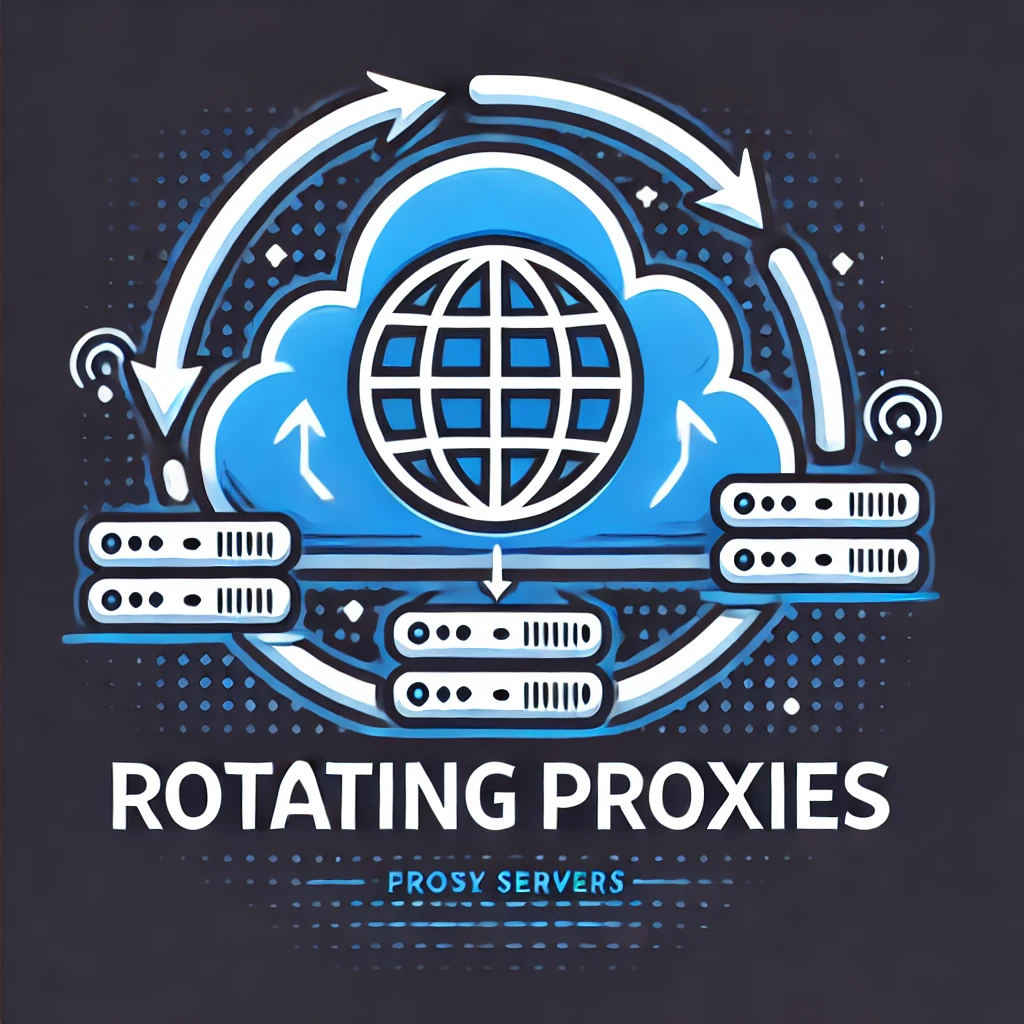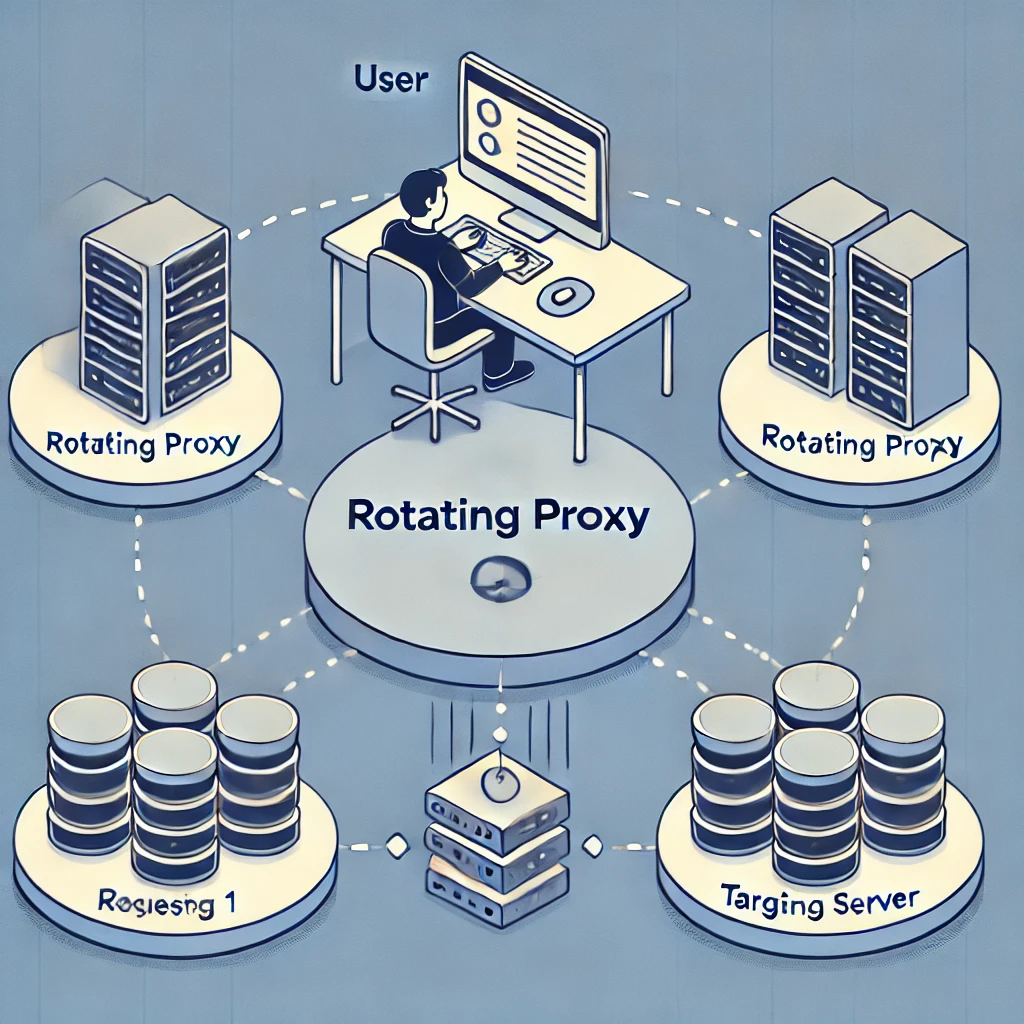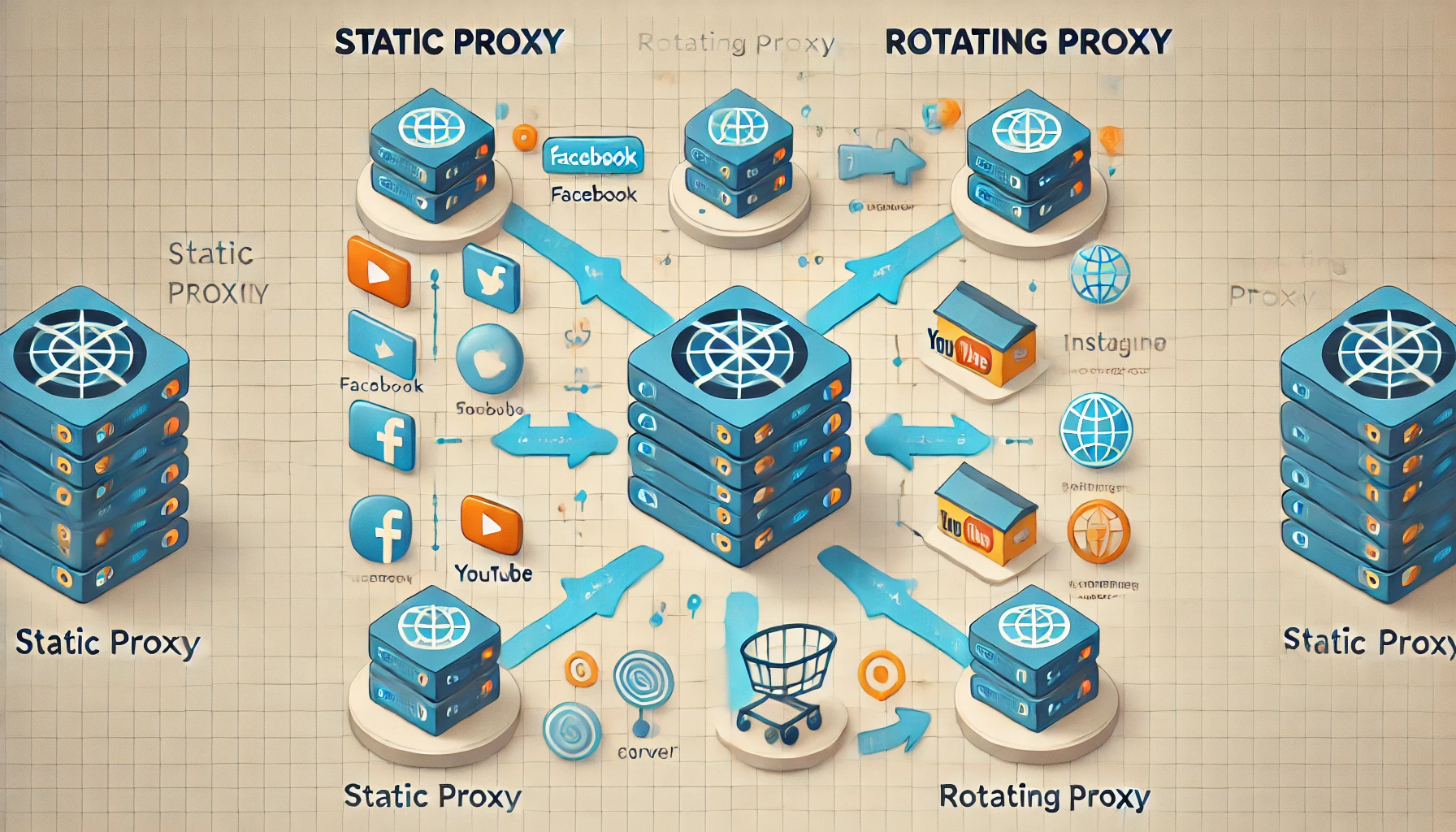In today’s digital age, anonymity and data security have become paramount concerns for businesses and individuals alike. As the internet continues to evolve, so do the methods used to protect privacy and enhance online operations. One such method is the use of rotating proxies. Rotating residential proxies from trusted providers like Live Proxies ensures dynamic IP rotation, bolsters security, and provides seamless online experiences.
This article delves deep into what rotating proxies are, how they work, their benefits, applications, the differences between rotating and static proxies, and tips for choosing the right rotating proxy service.
Key Takeaways
- Rotating proxies dynamically change IP addresses, enhancing anonymity and helping users avoid detection while conducting online activities.
- They are particularly useful for web scraping, ad verification, SEO monitoring, and accessing geo-restricted content.
- Key advantages include improved data collection, reduced risk of IP bans, and cost-effectiveness compared to static proxies.
- Choosing the right rotating proxies involves considering factors like IP pool diversity, rotation policy, speed, and customer support.
- Understanding the functionality and benefits of rotating proxies empowers users to effectively leverage them for privacy and security in the digital landscape.
Table of Contents
What Are Rotating Proxies?
Rotating proxies, also known as rotating proxy servers, are intermediaries that assign a new IP address from a pool of available IPs with each new connection or at regular intervals. Unlike static proxies, which provide a single IP address for all connections, rotating proxies offer a dynamic and constantly changing IP address. This rotation can happen after a certain number of requests or after a specified time period. As a result, it enhances anonymity and makes it harder for websites to track or block the user.

Rotating proxies work by routing internet traffic through a server that changes the IP address periodically. This process involves its server, which manages a pool of IP addresses and assigns them to users on a rotating basis. Each request to a website is sent from a different IP address. Consequently, it appears as though the requests are coming from different users.
The use of rotating proxies is particularly prevalent in activities that require high levels of anonymity and data extraction from websites that implement anti-scraping measures. Constantly changing IP addresses helps users bypass IP-based restrictions and avoid detection.
How Do Rotating Proxies Work?
The operation of rotating proxies involves several key components and processes:
- Proxy Pool Management: A rotating proxy service typically maintains a large pool of IP addresses. These IP addresses can be from various locations and ISPs, enhancing the diversity of the pool. It manages this pool, ensuring that each IP address is assigned and rotated efficiently.
- IP Address Rotation: The core feature of it is the rotation of IP addresses. This can be achieved through different methods, such as rotating after each request, rotating at fixed time intervals, or rotating based on specific triggers set by the user. The rotation process ensures that each request appears to come from a different IP address.
- Request Routing: When a user sends a request through a rotating proxy, the request is routed through the proxy server, which assigns a new IP address from the pool. The proxy server then forwards the request to the target website, and the response is sent back to the user through the same proxy server.
- Anonymity and Obfuscation: By changing IP addresses frequently and rotating proxies obscure their real IP addresses, making it difficult for websites to track or block them. This level of anonymity is crucial for activities such as web scraping, where users need to avoid IP bans and rate limiting.

Advantages of Using Rotating Proxies
Rotating proxies offer several advantages that make them a preferred choice for many online activities. Here are some of the key benefits:
- Enhanced Anonymity: Rotating proxies provide a high level of anonymity by constantly changing the IP address. This makes it challenging for websites to track and identify the user.
- Avoiding IP Bans: Websites often implement IP-based restrictions to prevent automated activities such as web scraping. Rotating proxies help users bypass these restrictions by using a different IP address for each request.
- Improved Data Collection: For activities like web scraping and data mining, rotating proxies enable users to collect large amounts of data without getting blocked. The rotating IP addresses mimic the behavior of multiple users, reducing the likelihood of detection.
- Geo-targeting Capabilities: Many rotating proxy services offer IP addresses from different geographical locations. This allows users to access region-specific content and conduct market research in multiple regions.
- Increased Efficiency: Rotating proxies distribute the load across multiple IP addresses. As a result, they reduce the risk of overloading a single IP and improve the overall efficiency of data collection processes.
- Reduced Risk of Blacklisting: Static IP addresses can be blacklisted if they are used for suspicious activities. Rotating proxies mitigates this risk by frequently changing IP addresses, making it harder for them to be blacklisted.
- Cost-Effective Solution: Rotating proxies can be more cost-effective than using a large number of static proxies. Users can achieve similar results with fewer IP addresses by leveraging the rotation mechanism.
Why You Need Rotating Proxies and How They Are Used
Rotating proxies are essential for various online activities that require anonymity, data extraction, and access to restricted content. Here are some common use cases:

- Web Scraping: Rotating proxies are widely used for web scraping to gather data from websites without getting blocked. By rotating IP addresses, users can mimic the behavior of multiple users and avoid detection.
- Ad Verification: Companies use it to verify the accuracy of online ads. This ensures they are displayed correctly across different regions.
- SEO Monitoring: Rotating proxies help SEO professionals track search engine rankings and monitor competitors without triggering IP bans.
- Social Media Management: Managing multiple social media accounts often requires rotating proxies to avoid being flagged for suspicious activity.
- Price Comparison: E-commerce companies use rotating proxies to gather pricing information from competitors’ websites without being blocked.
- Market Research: Rotating proxies enable researchers to collect data from various sources and analyze market trends across different regions.
- Accessing Geo-restricted Content: Rotating proxies allow users to access content restricted to specific geographical locations, such as streaming services and news websites.
- Cybersecurity Testing: Penetration testers and security researchers use rotating proxies to simulate attacks and test the security of websites and applications.
- Fraud Prevention: Businesses use rotating proxies to detect and prevent fraudulent activities by monitoring user behavior and identifying suspicious patterns.
- Academic Research: Researchers use rotating proxies to access academic resources and gather data for studies without facing access restrictions.
In summary, rotating proxies are indispensable for various online activities that require anonymity, data extraction, and access to restricted content. Their ability to rotate IP addresses ensures users can conduct these activities efficiently and securely.
Differences Between Rotating and Static Proxies

Understanding the differences between rotating and static proxies is crucial for selecting the right type of proxy for your needs. Here are the main distinctions:
Proxy Rotation System
- IP Address Stability: The IP address changes frequently, providing a high level of anonymity and reducing the risk of detection.
- Anonymity: Provide enhanced anonymity by constantly changing the IP address, making it difficult for websites to track the user.
- Use Cases: Ideal for activities that require high levels of anonymity and large-scale data extraction, such as web scraping, SEO monitoring, and market research.
- Risk of IP Bans: Lower risk of IP bans due to the frequent change of IP addresses.
- Cost: Can be more cost-effective for large-scale operations as they reduce the need for multiple static IP addresses.
Static Proxies
- IP Address Stability: The IP address remains constant, offering a stable connection but with a higher risk of detection and IP bans.
- Anonymity: Offers less anonymity since the IP address remains the same for all requests.
- Use Cases: Suitable for tasks that need a stable connection, such as accessing geo-restricted content, conducting online transactions, and maintaining consistent sessions.
- Risk of IP Bans: Higher risk of IP bans since the same IP address is used for all requests.
- Cost: May be more expensive if multiple IP addresses are required for different tasks.
These differences will help you understand which proxy is best for you. If you need high-quality IPv4 proxies with rotation providing unlimited bandwidth, consider using the Proxy5 service. This service has proven itself with a huge number of servers. They work throughout the lease period and support various connection protocols.
How to Choose Rotating IP Proxies
Selecting the right service is essential for maximizing the benefits and ensuring seamless operations. Here are some factors to consider when choosing dynamic proxies:
IP Pool Size and Diversity
A large and diverse IP pool ensures better anonymity and reduces the risk of detection. Look for providers that offer IP addresses from various locations and ISPs.
Rotation Policy
Understand the rotation policy of the provider. Some of the IP addresses are rotated after each request, while others rotate at fixed intervals. Choose a rotation policy that suits your needs.
Speed and Reliability
Check the speed and reliability of the proxy service. Slow or unreliable performance can hinder your operations and affect the efficiency of your tasks.
Geo-targeting Capabilities
If you need to access region-specific content, ensure the proxy service offers IP addresses from the desired geographical locations.
Customer Support
Good customer support is crucial for resolving any issues that may arise during the use of the proxy service. Look for providers with responsive and knowledgeable support teams.
Pricing
Compare the pricing plans of different providers and choose one that offers good value for money. Consider the cost-effectiveness of the service based on your usage requirements.
Security Features
Ensure the right service provides robust security features, such as encryption and authentication, to protect your data and maintain privacy.
User Reviews
Check user reviews and testimonials to gauge the reputation and reliability of the service. Positive feedback from other users can be a good indicator of the quality of the service.

It plays a vital role in enhancing online anonymity, enabling data extraction, and accessing restricted content. Their ability to frequently change IP addresses provides significant advantages over static IP addresses, making them a preferred choice for many online activities.
By understanding what rotating proxies are, how they work, their benefits, and how to choose the right service, users can leverage these tools effectively to achieve their goals. They can do this while maintaining privacy and security. Whether for web scraping, SEO monitoring, market research, or other applications, rotating proxies offer a versatile and powerful solution in the ever-evolving digital landscape.











